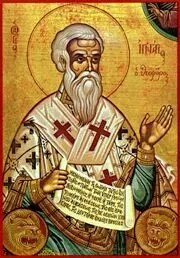Saint Ignatius of Antioch, also known as Ignatius Theophore, occupies an exceptional place in the history of early Christianity as a martyr, theologian and Apostolic Father. Its legacy endures through the centuries, recalling the importance of faith, perseverance and witness in the lives of the early Christians. In this article, we will explore the life and legacy of Saint Ignatius of Antioch.

I- The Life of Saint Ignatius of Antioch
Saint Ignatius of Antioch, also known as Ignatius Theophore, is a prominent figure in early Christianity. To fully understand his significance, it is essential to delve into his life, his theological contribution, and his heroic witness to the faith.
1. Birth and Youth: Ignatius was born around the year 35 AD, at a time when nascent Christianity was beginning to spread. He had the privilege of living in Antioch, a renowned city in the Roman Empire, where Jesus' disciples were first called "Christians" (Acts 11:26). It was in this context that Ignatius embraced the Christian faith.
2. Leadership within the Church: Ignatius became a leader in the Church of Antioch. As bishop, he played a crucial role in the teaching and spiritual direction of his community.
3. Martyrdom and Journey to Rome: Ignatius is best known for his courageous martyrdom. In 107 AD, during the reign of Emperor Trajan, he was arrested because of his Christian faith. His journey in captivity took him from Syria to Rome, where he was to be executed. However, Ignatius did not flinch from the prospect of martyrdom. Rather, he wrote inspiring letters to different Christian communities along the way, urging believers to remain strong in their faith.
4. The Letters of Ignatius: The letters written by Ignatius during his journey to martyrdom constitute a theological and historical treasure. They offer a fascinating insight into the life of the early Church, its structure and its doctrine. Ignatius emphasized key ideas, such as the importance of Church unity, the role of bishops, and the reality of martyrdom as the ultimate testimony to the Christian faith.
5. Theological Heritage: The theological importance of Ignatius lies in his continuity with the teaching of the apostles. As a first-century clergyman, he was a first-hand witness to apostolic teaching. He emphasized the need to preserve apostolic tradition and warned against incipient heresies, thereby contributing to Christian orthodoxy.
6. Legacy of Ignatius: The legacy of Saint Ignatius of Antioch remains alive and vibrant. His writings are a valuable source for theologians, historians, and believers seeking to understand the roots of Christianity. His heroic martyrdom reminds Christians of the importance of unwavering faith and courageous witness, even in the face of adversity.
Saint Ignatius of Antioch is a witness to early Christianity, a model of fidelity to the faith and a fearless defender of the apostolic tradition. His example continues to inspire Christians around the world to persevere in their faith, maintain the unity of the Church, and bear witness to Christ with unwavering faith.

II- The Theological Contribution of Ignatius of Antioch
The theological contribution of Saint Ignatius of Antioch is of capital importance in the history of emerging Christianity. His letters, written during his journey to martyrdom, contain key theological elements that shaped understandings of the Christian faith. Here is an overview of these major contributions:
1. The Doctrine of the Episcopate: Ignatius is one of the first theologians to formulate the doctrine of the episcopate, that is to say the ecclesiastical hierarchy with bishops, priests and deacons. In his letters he emphasizes the importance of bishops as guardians of the apostolic faith and calls them the "guardians of reality" in reference to the Eucharist. This perspective on the episcopacy helped strengthen the ecclesiastical structure and establish the primacy of bishops in Christian communities.
2. The Unity of the Church: Ignatius emphasizes the unity of the Church in his letters. He exhorts Christians to remain united under the authority of bishops, to avoid divisions and to reject emerging heresies. His emphasis on church unity helped preserve cohesion within early Christian communities and establish a theological foundation for ecclesiastical unity.
3. The Reality of the Eucharist: Ignatius testifies to the belief in the reality of the Eucharist. He affirms that the Eucharist is the “bread of heaven” and “remedy of immortality”. This belief in the real presence of Jesus Christ in the Eucharist has helped to strengthen the understanding of this central sacrament in the Christian faith.
4. The Importance of Martyrdom: As a martyr himself, Ignatius wrote about the importance of martyrdom as the supreme testimony to the Christian faith. He considered martyrdom to be a participation in the passion of Christ and a guarantee of resurrection. This perspective influenced the way early Christians approached martyrdom and strengthened their resolve to bear witness to their faith, even at the cost of their lives.
5. Opposition to Heresies: In his letters, Ignatius opposed emerging heresies, notably Docetism, which denied the reality of the incarnation of Jesus. It emphasizes the full humanity and divinity of Jesus Christ, affirming that it was through his divine nature that he conquered death. This opposition to heresies contributed to the preservation of orthodox Christian doctrine.
In summary, Saint Ignatius of Antioch left a significant theological legacy for Christianity. His teachings on the episcopacy, the unity of the Church, the reality of the Eucharist, the importance of martyrdom and opposition to heresies profoundly influenced the early Christian faith and continue to guide theological understanding of the Church today. His letters remain a valuable source of inspiration for believers and theologians.

III- The Letter to the Romans: A Major Theological Testimony
One of Saint Ignatius of Antioch's most significant contributions to Christian theology is found in his letter to the Romans. This letter, written during his journey to martyrdom in Rome, is a major theological testimony to his faith and his understanding of the Christian faith. Here are some of the key points made in this letter that continue to influence Christian theology:
1. The Unity of the Church: In his letter to the Romans, Ignatius emphasizes the importance of the unity of the Church. He urges Christians to be united in faith and obey their bishops and leaders. His vision of a united Church under the authority of bishops had a lasting impact on Church doctrine and the understanding of Christian unity.
2. The Bishop as Guardian of the Faith: Ignatius emphasizes the central role of bishops in the preservation of the Christian faith. He regards the bishop as the guardian of the apostolic faith and exhorts Christians to submit to the authority of their bishop. This hierarchical view of the Church had a considerable influence on the later development of the ecclesiastical structure.
3. The Eucharistic Doctrine: In his letter to the Romans, Ignatius refers to the Eucharist as the “doctor of immortality” and emphasizes the reality of the flesh and blood of Jesus Christ in this sacrament. His understanding of the real presence of Christ in the Eucharist contributed to later Eucharistic theology.
4. The Testimony of Martyrdom: Ignatius of Antioch speaks of his own imminent martyrdom in his letter to the Romans. His courageous and resolute attitude in the face of persecution has inspired many Christians throughout the ages to remain faithful to their faith, even at the cost of their lives. His testimony of martyrdom continues to be a source of inspiration for believers.
5. Love and Humility: Ignatius exhorts Christians to demonstrate love and humility in their relationships with one another. His letter highlights these Christian virtues as key elements of the Christian life.
The Letter to the Romans of Saint Ignatius of Antioch remains a valuable theological text that offers significant insights into Christian faith and practice in the 2nd century. His theological legacy, centered on the unity of the Church, the role of bishops, the Eucharistic doctrine, the witness of martyrdom and the call to love and humility, continues to influence contemporary Christian theology. Saint Ignatius remains a powerful witness to the early Christian faith and perseverance in the faith.

Conclusion
In conclusion, Saint Ignatius of Antioch remains a revered and influential figure within the Catholic Church. His legacy as a witness to martyrdom, defender of the Christian faith, and contributor to Eucharistic and Episcopal theology continues to inspire and inform the Catholic faith. His example of unwavering faith in the face of persecution, as well as his teachings on the unity of the Church, remain relevant to Catholic believers today.
Catholics honor St. Ignatius of Antioch on his feast day on October 17 and consider him a model of holiness, courage and fidelity to Christian tradition. His writings, particularly his letters, continue to be studied and pondered by those seeking to deepen their understanding of the Catholic faith and its evolution over the centuries.
In short, Saint Ignatius of Antioch remains a pillar of the Catholic faith, reminding believers of the importance of remaining firm in their commitment to Christ, maintaining the unity of the Church and defending the truth of the Eucharist , while promoting fraternal love and communion in faith.





